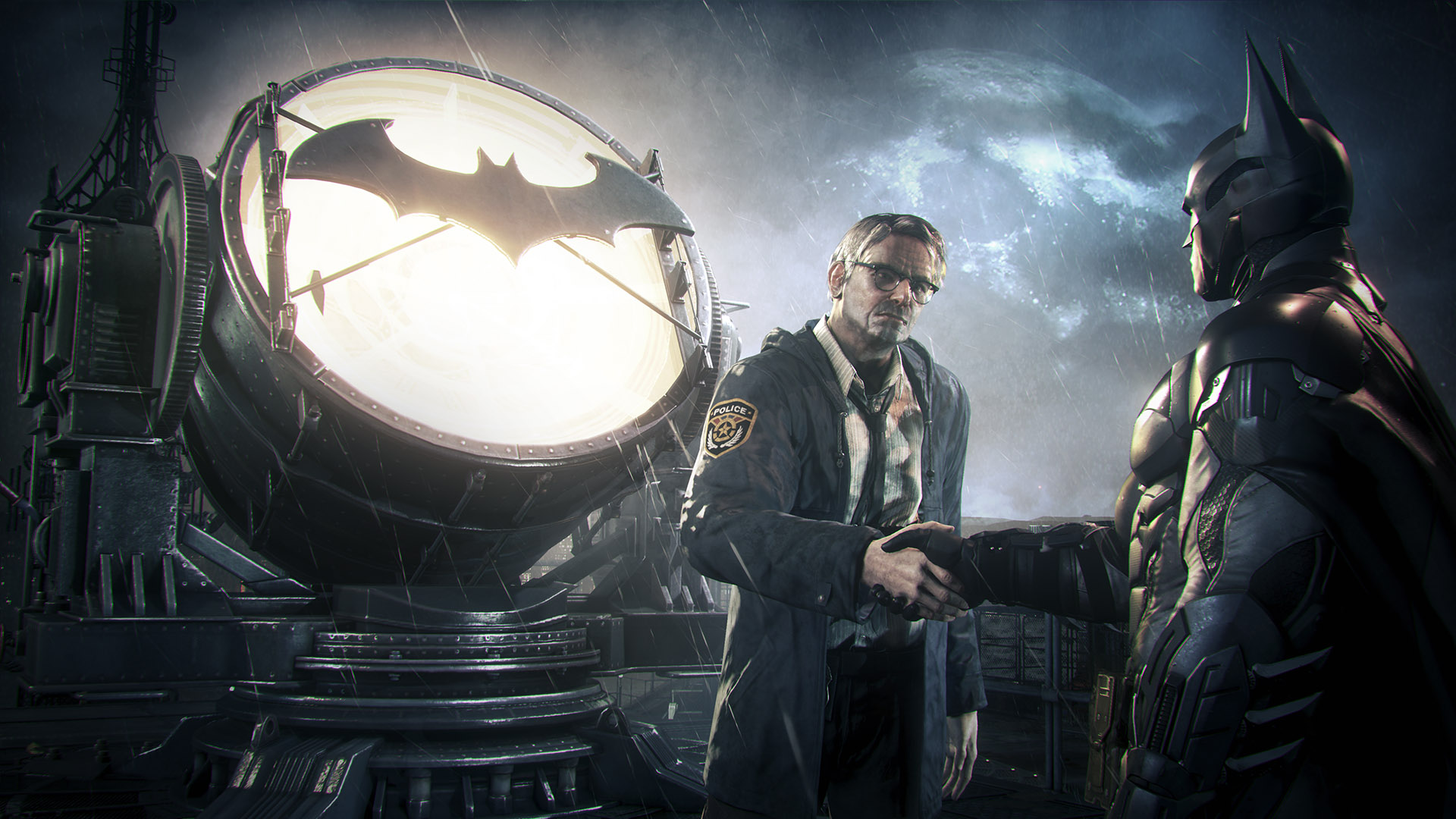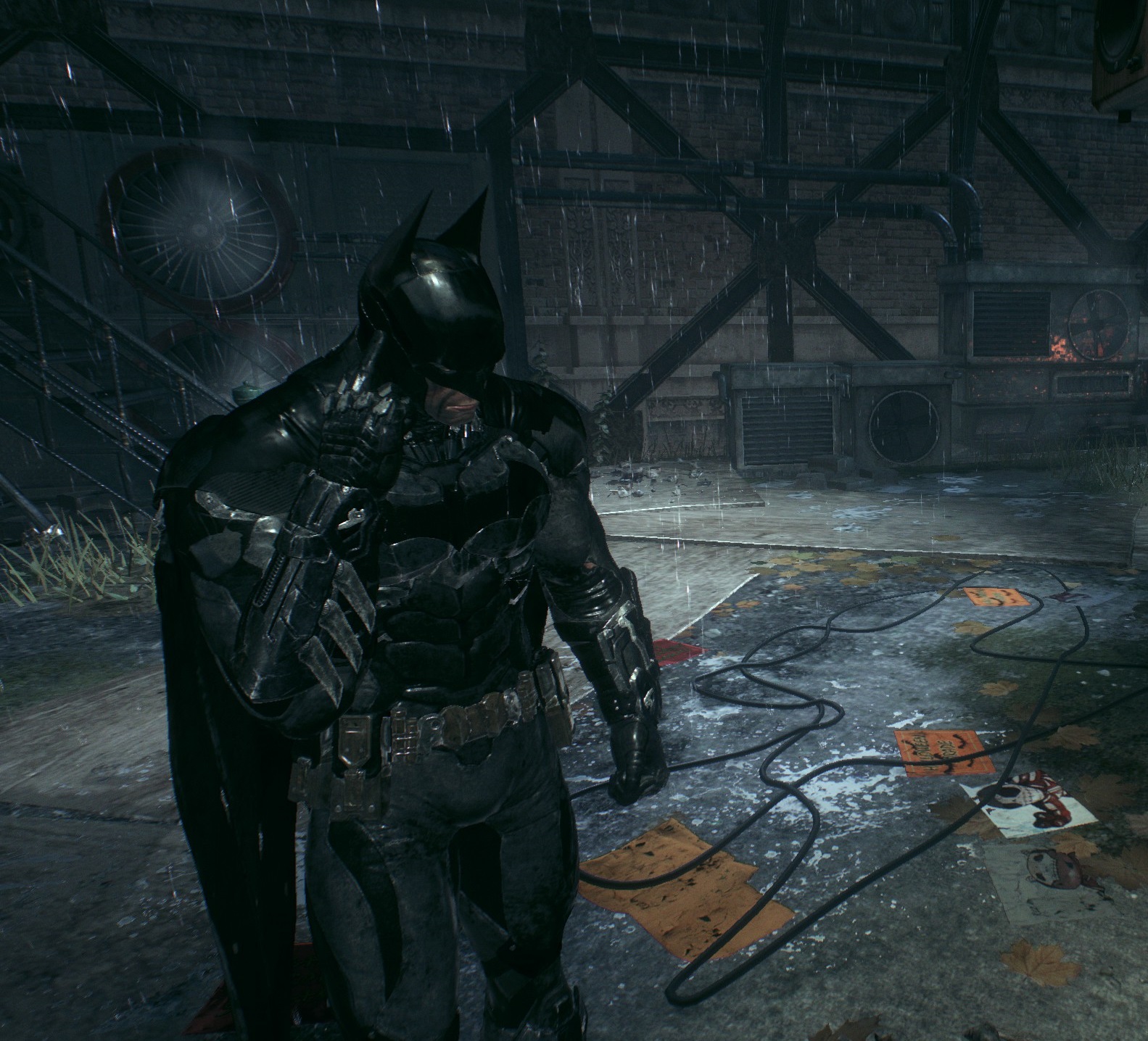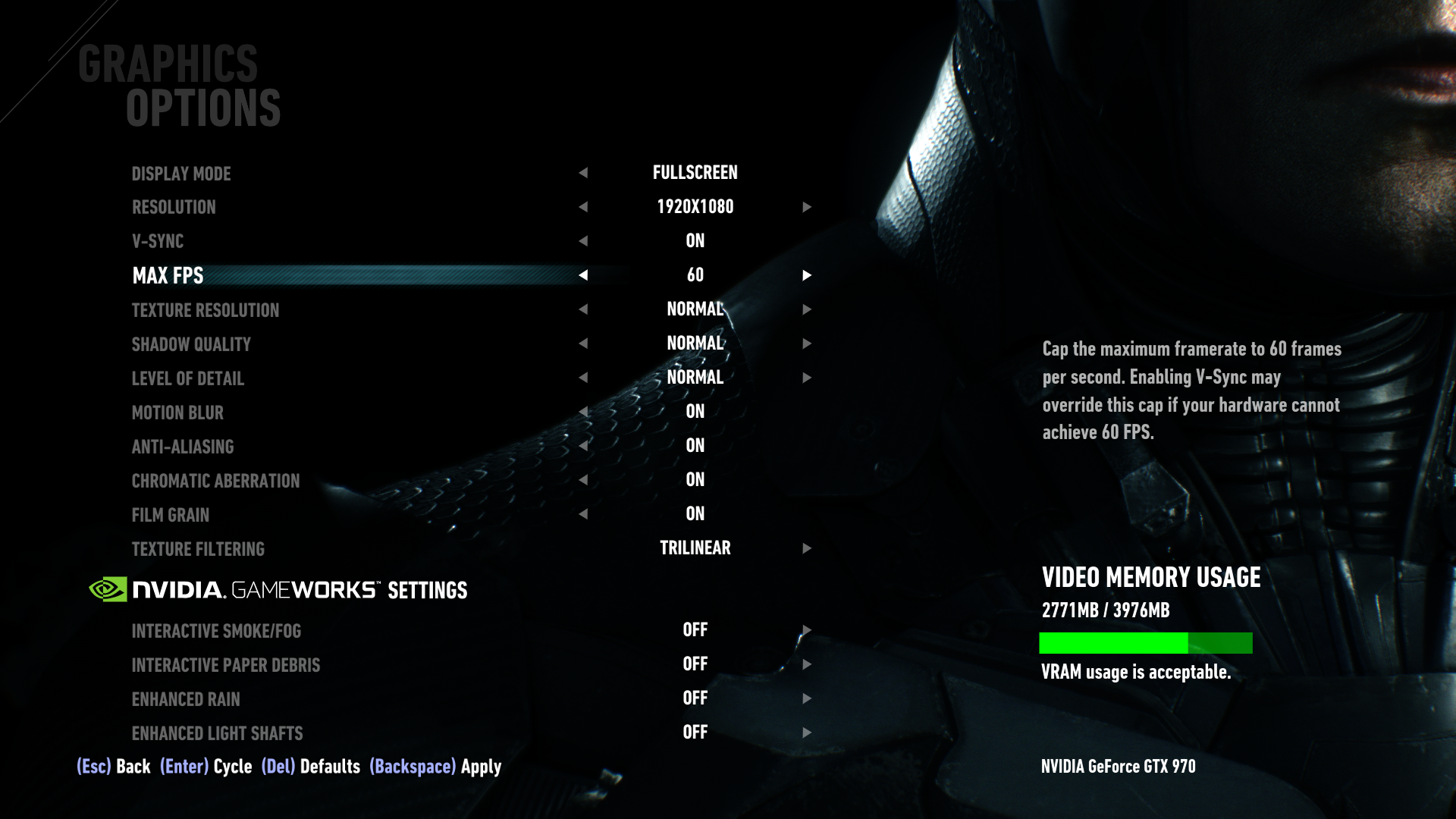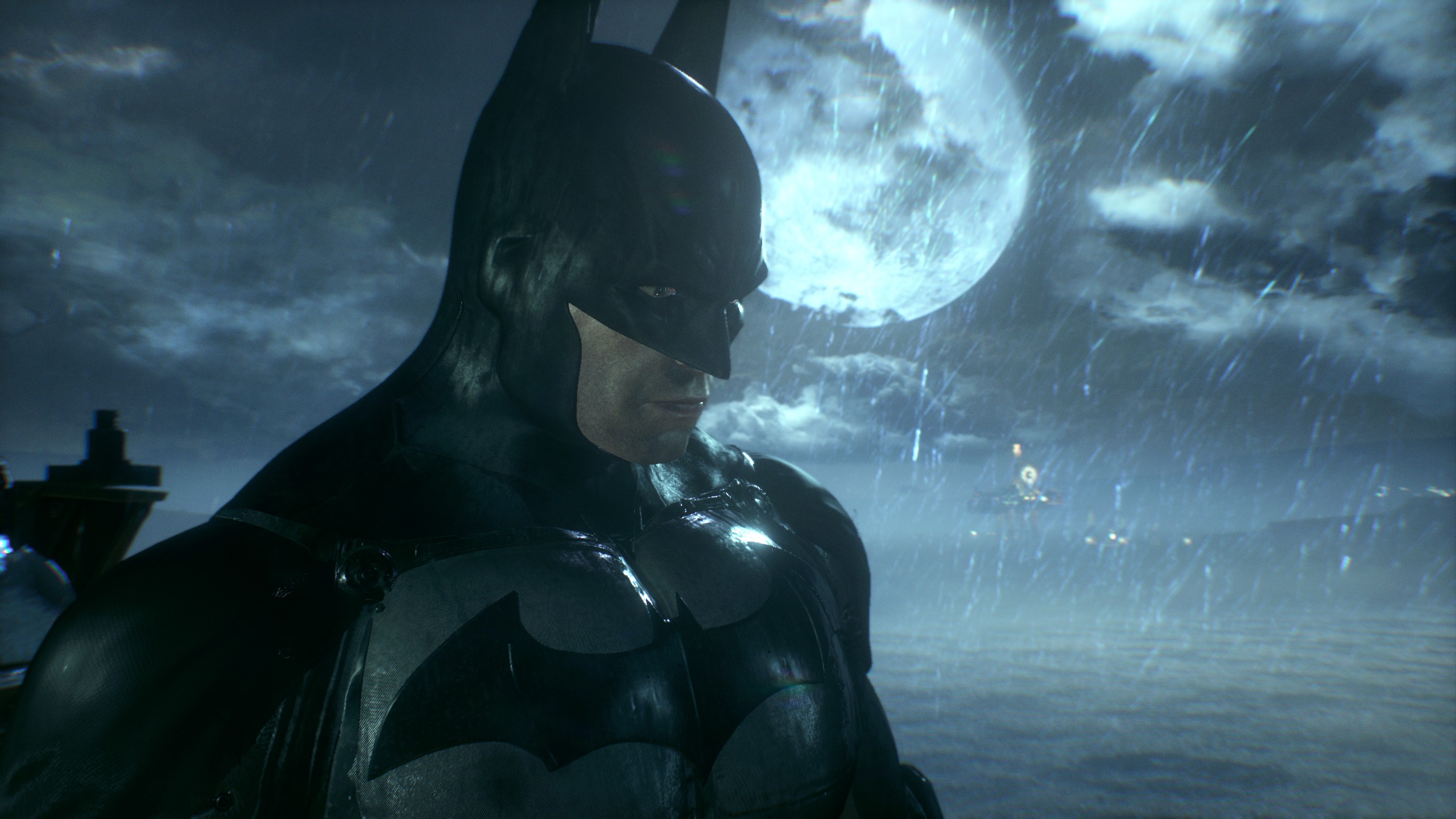WB Games Finally Patches 'Batman: Arkham Knight.' Is It Better Or Worse?
Last month, WB Games announced that the partially-broken PC edition of Batman: Arkham Knight would be patched soon, promising major improvements such as memory and VRAM optimization, improved GPU performance, more comprehensive in-game settings and improved HDD performance. The patch has finally been deployed, but did the company really fix everything on its massive list of problems?
The Story Thus Far…
After the launch of Batman:Arkham Knight, the general consensus was that the PC edition of the game was an utter failure, with massive performance issues and problems ranging across a broad spectrum of hardware configurations, leaving a sour taste in the mouths of customers who purchased or preordered the highly-anticipated title.
WB Games immediately went into damage control mode and released an update to try to fix some of the issues, but the day one patches were ineffective. WB Games later addressed the calamity and admitted the problems were far more widespread and deep rooted than initially believed, pulling the game from stores with the promise of fixing things and bringing Batman: Arkham Knight back as quickly as possible.
In our hands on look at the game, we concluded that although the gameplay of Batman: Arkham Knight was thrilling and everything a fan could hope to expect from the popular series, the performance issues were inexcusable and needed to be worked out. It was a shame such an anticipated game could be released in such a manner, and it was a sad day for Batman fans (and that's a lot of sad Batmans).
Official word of an interim patch came just a few weeks ago, but frustrated fans did not seem to care, feeling disenfranchised and doubtful the announcement indicated that we would see the patch anytime soon.
Two months after the game's release, and two weeks after testing began, a patch finally arrived. We decided to take another look at the game to see if WB Games came through on its vow to remedy the performance problems that have plagued Batman: Arkham Knight since day one.
General Improvements And Optimizations
The patch did deliver on several key promises made by WB Games, most notably a good portion of the hardware issues. The overhaul improved system memory and VRAM usage, performance issues when running HDDs, and it enhanced the game's performance on all graphics card configurations (with the latest drivers installed, of course).
Get Tom's Hardware's best news and in-depth reviews, straight to your inbox.
The graphic options menu has been expanded, allowing users to toggle anti-aliasing, motion blur and chromatic aberration on or off. Texture filtering can be set to trilinear, 2x, 4x, 8x or 16x anisotropic filtering, dramatically increasing the range of control players have over the graphics hardware compared to the previous version.
Perhaps one of the most noted complaints about the PC version, the 30 fps cap, is gone. Players can now change the frame rate cap to much higher settings in-game, instead of resorting to manual .ini file edits as some gamers did when confronted with the annoying 30 fps cap.
The new graphic options menu even displays a convenient VRAM usage meter, giving users an approximate idea of what impact each setting will have on their graphics hardware and indicating whether or not it can handle those settings.
Gameplay And Benchmarks
After loading the latest Nvidia drivers and updating the game, I suited up one more time and hit the streets of Gotham to see if there was a noticeable difference in performance. The gameplay indeed looked a little better, with a 60 fps cap making the experience much more enjoyable than the previous 30 fps limitation. Camera movement was smoother, and overall, there seems to be an improvement from my previous forays in Batman: Arkham Knight.
For our initial look at the game, I tested Batman: Arkham Knight using an Intel Core i7-4690K overclocked to 4.4 GHz on an ASUS Z97I mini-ITX motherboard with 16 GB (2 x 8 GB) of Patriot Viper DDR3- 2133 MHz RAM. A 500 GB Samsung 840 Evo SSD kept me from the reported HDD performance issues, and an EVGA Nvidia GeForce GTX 970 SC 4 GB GDDR5 graphics card made gameplay pretty acceptable, despite the issues many others were experiencing.
I decided to run the in-game benchmarks again on the same rig to see if there was any measurable difference in performance between when I wrote about the game and now, using the same settings as before. Here is a table of our original results combined with our post-update benchmark results:
| Header Cell - Column 0 | 1080p (Prepatch) | 1080p (Patched) | 1440p (Prepatch) | 1440p (Patched) | 4K (Prepatch) | 4K (Patched) |
|---|---|---|---|---|---|---|
| Min | 68 fps | 31 fps | 61 fps | 57 fps | 30 fps | 27 fps |
| Max | 120 fps | 97 fps | 102 fps | 109 fps | 52 fps | 55 fps |
| Average | 86 fps | 62 fps | 75 fps | 77 fps | 36 fps | 37 fps |
The minimum frame rate at 3840x2160 and 2560x1440 fell a few frames, but it also gained a few frames for max and average frame rates, remaining relatively unchanged in performance. The 1920x1080 results are not what we expected at all. With graphics and Nvidia Gameworks settings turned all the way up, the benchmark results demonstrated pretty respectable performance, averaging 62 fps. However, the drastic drop in performance compared to the previous benchmark results was very alarming. Did performance at 1080p decrease with the release of the new patch?
While in the graphics options menu, I was replicating the same settings used in our initial benchmark tests. When applying Nvidia Gameworks settings, I was prompted that a reset was required for Nvidia Gameworks settings to take effect, something that had not happened previously when changing those settings. Also, the handy VRAM usage meter that I mentioned before showed that my settings were over what my 4 GB graphics card could handle, but I ran the benchmark anyway.
It could be that the initial benchmarks I performed didn't have the Gameworks settings truly enabled at the time of testing, as I was not prompted for a restart of the game for them to take effect at that time. This error would not affect the 1440p and 4K benchmark results, because Gameworks settings were not used for them. I decided to dive a little deeper to see what the problem could be and tested different settings at 1920x1080 resolution. Here are the results:
| Header Cell - Column 0 | 1080p Original Benchmark Results (Prepatch) | 1080p, All Max Settings w/ Gameworks Enabled | 1080p, Normal Textures w/ Gameworks Enabled | 1080p, All Max Settings w/ Gameworks Disabled |
|---|---|---|---|---|
| Min | 68 fps | 31 fps | 34 fps | 79 fps |
| Max | 120 fps | 97 fps | 95 fps | 133 fps |
| Average | 86 fps | 62 fps | 63 fps | 98 fps |
It appears as though my theory was correct. When lowering the texture resolution to normal in order get the VRAM usage under my video card's 4 GB maximum, performance does not seem to fluctuate too much at all. Disabling the Nvidia Gameworks settings completely and pushing the texture resolution back up to high produced performance results more in line with the pre-patch benchmarks, and the newer test actually performed better by over 10 fps on its minimum, maximum and average frame rates. It's probably safe to say that our initial benchmarks results did not have the Gameworks settings in play at the time of testing, and that 1080p saw a decent bump in performance because of the new patch.
These benchmark results are not indicative of real-world performance (as we noted earlier), but overall, these tests show that there is indeed a slight but measurable performance increase at resolutions higher than 1440p, despite a small minimum frame rate loss, but also moderate gains across the board at 1920x1080. Combine that with noticeably smoother gameplay (at least on this test bench), and it appears WB Games delivered on this particular performance boost promise.
Still Working It Out
Despite the performance optimizations, several key features and improvements were left out of this interim patch, with WB Games again promising to direct its full attention to the remaining issues now that the bulk of the unbearable glitches are seemingly resolved.
SLI and Crossfire support, AMD GPU improvements for Windows 10, and a Windows 7 memory issue for users with 8 GB of RAM and Nvidia GPUs are still on the to-do list, and DLC content such as A Matter of Family and features like Photo Mode are expected to be added to the PC version of the game in the future as well.
However, not everyone seems to be enjoying the fixes. There have been several reports of continued instability and lackluster performance diminishing what was supposed to be relief for gamers who have patiently (or impatiently) awaited the promised land of smooth PC gameplay and epic DLC content for the final chapter of the Batman: Arkham franchise.
If you are still experiencing gameplay issues and poor performance, WB Games has once again promised to continue its work on the game.
"As always, we will monitor for any additional issues that come up and will provide further optimizations and bug fixes along the way," stated a press release. "We would like to thank everyone for their patience and invaluable feedback."
Although it's nice of WB Games to apologize for the delays and to thank us for our patience, asking for more time to completely fix Batman: Arkham Knight might come off as a bit crass to some players whose patience has run out from disappointing game launches and untimely fixes.
Follow Derek Forrest @TheDerekForrest. Follow us @tomshardware, on Facebook and on Google+.
Derek Forrest was a contributing freelance writer for Tom's Hardware. He covered hardware news and reviews, focusing on gaming desktops and laptops.
-
Larry Litmanen I wonder if this whole thing will end up having unintended consequences,since PCs come in so many configurations to make sure the game works with every PC development costs will be higher, so will this whole thing lead to developers pricing games on the same level as consoles.Reply
Also it makes me wonder if some will conclude that it is just not worth the trouble to deal with PCs in the first place, much easier to just do PS4 and XBox One.
-
thor220 ReplyI wonder if this whole thing will end up having unintended consequences,since PCs come in so many configurations to make sure the game works with every PC development costs will be higher, so will this whole thing lead to developers pricing games on the same level as consoles.
Also it makes me wonder if some will conclude that it is just not worth the trouble to deal with PCs in the first place, much easier to just do PS4 and XBox One.
No one will come to that conclusion. What we have here is a game company that decided to outsource it's PC port to another company to save money. It ended up doing more harm than good.
Developing for PC isn't hard, the console hardware is incredibly similar. I always find it funny when people do bring up the "it's hard to program for PC" point because it's easier now than ever to release a game on PC thanks to software abstraction. Believe it or not, consoles are harder to program for. An entire new low level SDK has to be created and learned by developers. There is no such need for the PC. -
darkchazz I'm wondering why the game needs that much VRAM. The textures are really nothing special even on the highest setting.Reply
Could be they don't even use any form of texture streaming ?
With my GTX 680 I have to set the textures to low else it will stutter heavily. -
Larry Litmanen ReplyI wonder if this whole thing will end up having unintended consequences,since PCs come in so many configurations to make sure the game works with every PC development costs will be higher, so will this whole thing lead to developers pricing games on the same level as consoles.
Also it makes me wonder if some will conclude that it is just not worth the trouble to deal with PCs in the first place, much easier to just do PS4 and XBox One.
No one will come to that conclusion. What we have here is a game company that decided to outsource it's PC port to another company to save money. It ended up doing more harm than good.
Developing for PC isn't hard, the console hardware is incredibly similar. I always find it funny when people do bring up the "it's hard to program for PC" point because it's easier now than ever to release a game on PC thanks to software abstraction. Believe it or not, consoles are harder to program for. An entire new low level SDK has to be created and learned by developers. There is no such need for the PC.
Why are people so hung up on outsourcing, it's a standard procedure in almost every industry. You can't always hire people for every single need because you may not need these people beyond one project.
It seems like people blame the concept of outsourcing because someone did a bad job.
Imagine Toms wants to redesign the website, most likely they will hire a guy from a 3rd company to do it because it is a one time thing, they do not need the same guy on the payroll beyond this one project. -
billgatez ReplyI wonder if this whole thing will end up having unintended consequences,since PCs come in so many configurations to make sure the game works with every PC development costs will be higher, so will this whole thing lead to developers pricing games on the same level as consoles.
Also it makes me wonder if some will conclude that it is just not worth the trouble to deal with PCs in the first place, much easier to just do PS4 and XBox One.I wonder if this whole thing will end up having unintended consequences,since PCs come in so many configurations to make sure the game works with every PC development costs will be higher, so will this whole thing lead to developers pricing games on the same level as consoles.
Also it makes me wonder if some will conclude that it is just not worth the trouble to deal with PCs in the first place, much easier to just do PS4 and XBox One.I wonder if this whole thing will end up having unintended consequences,since PCs come in so many configurations to make sure the game works with every PC development costs will be higher, so will this whole thing lead to developers pricing games on the same level as consoles.
PC development is not hard. It's just different in that you develop for an API and not hardware.
Also it makes me wonder if some will conclude that it is just not worth the trouble to deal with PCs in the first place, much easier to just do PS4 and XBox One. -
surphninja ReplyWhy are people so hung up on outsourcing, it's a standard procedure in almost every industry. You can't always hire people for every single need because you may not need these people beyond one project.
It seems like people blame the concept of outsourcing because someone did a bad job.
Imagine Toms wants to redesign the website, most likely they will hire a guy from a 3rd company to do it because it is a one time thing, they do not need the same guy on the payroll beyond this one project.
There's a big difference between outsourcing to help delegate specialty work and outsourcing to cut corners. Clearly, this is a case of the latter. The pc version was obviously considered low priority, the work to port it was contracted out way too late in the development cycle, and the port was released even though the company knew that these game-breaking bugs existed.
The problems behind the pc port in this case have less to do with logistics and more to do with corporate greed. -
cknobman Learned my lesson years ago to never buy a PC game that is a console port until its in the bargain bin on steam.Reply
Two benefits:
A. Save a ton of money
B. Give them time to fix the game so it will run properly
-
jimmysmitty Reply16595941 said:I wonder if this whole thing will end up having unintended consequences,since PCs come in so many configurations to make sure the game works with every PC development costs will be higher, so will this whole thing lead to developers pricing games on the same level as consoles.
Also it makes me wonder if some will conclude that it is just not worth the trouble to deal with PCs in the first place, much easier to just do PS4 and XBox One.
No one will come to that conclusion. What we have here is a game company that decided to outsource it's PC port to another company to save money. It ended up doing more harm than good.
Developing for PC isn't hard, the console hardware is incredibly similar. I always find it funny when people do bring up the "it's hard to program for PC" point because it's easier now than ever to release a game on PC thanks to software abstraction. Believe it or not, consoles are harder to program for. An entire new low level SDK has to be created and learned by developers. There is no such need for the PC.
Of course developing for the PC is not hard. Optimizing is hard. That is what the biggest issue is.
Developing for a new console is hard but the newer consoles are not as hard due to their similarities to PC hardware. But Optimizing is easy because all the consoles have the exact same hardware, drivers and software so there is no variations to work on. Later on down the road though ti becomes even easier to develop for them since they get a lot of exclusives from the big game companies. I do think though that the XB1 and Windows 10 will make it easier for consoles than ever.
That is the difference. There is no way to optimize for every possible PC configuration and develop a game within the proper amount of time. That is what most people talk about.
As well it is not easy to find an issue and just fix it. A game is millions of lines of code which takes testing for each fix to make sure it doesn't cause another issue. Considering the changes they made, such as the changes to the memory utilization and such, that is a lot of work done deep in the game. It takes time.
-
gaborbarla Ok, so if you gonna re-release a broken game 6-12 months later, it better contain something extra awesomesauce or many will just say meh. And why stop at 90FPS, why cant we select 120?Reply -
Tzn ReplyI'm wondering why the game needs that much VRAM. The textures are really nothing special even on the highest setting.
Could be they don't even use any form of texture streaming ?
With my GTX 680 I have to set the textures to low else it will stutter heavily.
Because nvidia partnered with WB and offered the game with every purchase of nvidia cards beginning from 960 and up. In short nvidia wants to push people in to buying new cards with at least 2 gb of vram just to get money. Assholes, but that is gonna change in 2016 with AMD new gpu's.



